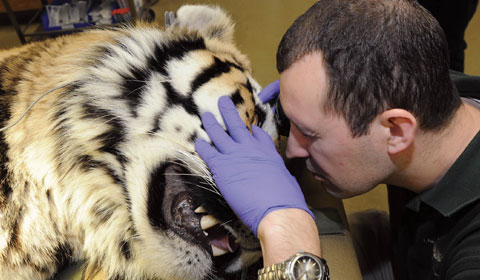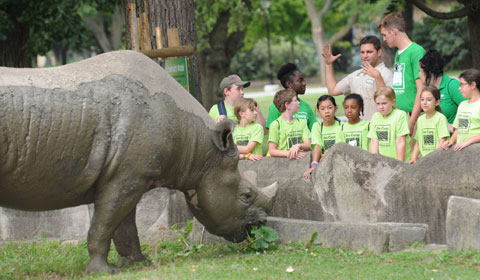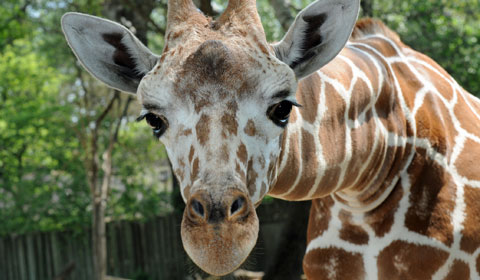News Release

August 25, 2014
FOR IMMEDIATE RELEASE
Note: A timeline and photos may be downloaded at the bottom of this page.
Endangered Mexican Gray Wolf from Brookfield Zoo Is Released into the Wild
Birth of Puppies Will Help Foster Genetic Diversity Within Wild Population
Brookfield, Ill. — A female Mexican gray wolf from Brookfield Zoo, which is managed by the Chicago Zoological Society, has been released into the wild. The wolf, F1126 (known as Ernesta at Brookfield Zoo), her mate M1051, and four of her pups—together named the Coronado pack—were released into the Gila Wilderness Area in New Mexico on July 22. The Society’s participation in this recovery program demonstrates its commitment to helping increase the Mexican gray wolf population in the wild, as well as to raising awareness about an iconic North American species that was on the brink of going extinct.
“We are thrilled to be able to contribute to the survival of this species, and Ernesta’s transfer was an important step to help foster genetic diversity within the reintroduced population,” said Bill Zeigler, senior vice president of collections and animal care for the Society.
The release comes three and a half months after a then-pregnant Ernesta and another mate, M1249, separated after being released at an Arizona location. After she delivered, members of the Mexican Wolf Interagency Field Team (includes U.S. Fish and Wildlife Service, Arizona Game and Fish Department, White Mountain Apache Tribe, USDA Forest Service, USDA Animal and Plant Health Inspection Service – Wildlife Services, and several participating counties in Arizona) retrieved Ernesta and her six pups due to concern that she would not be able to successfully raise them in the wild without a mate to assist her with rearing and hunting.
Ernesta and four of her pups were transported to the U.S. Fish & Wildlife Services’ Sevilleta Wolf Management Facility in New Mexico. The other two pups were cross-fostered with an established wild pack that is raising them as its own, resulting in the first successful cross-fostering attempt in the wild. (Cross-fostering is a technique in which very young pups are moved from one litter into a different, similar-age litter so that the receiving pack will raise them as their own.)
Back at the management facility, Ernesta and her pups were successfully reintroduced to her 2013 mate, M1051, so that both an adult male and female could rear the pups and provide a cohesive pack for their release into the wild. M1051 took easily to the role of foster father and adopted Ernesta’s four pups as his own. Ernesta, M1051, and the pups were released to an enclosure that is designed to allow them to chew through and self-release at any time, which they did on July 24.
Ernesta was born in 2008 at the Endangered Wolf Center in Eureka, MO, and arrived at Brookfield Zoo in 2010. Deemed a good candidate for release to the wild because of her excellent health, genetics, and exhibition of natural instincts, Ernesta left Brookfield Zoo in 2012 to prepare for life in the wild at the Sevilleta Wolf Management Facility. While there, she learned survival skills during a prerelease “boot camp” lasting several months.” (She was scheduled for release with her mate, M1051, but due to another wolf pack that was acting aggressively in the area, their release was delayed.)
While Ernesta’s prerelease education at the Wolf Management Facility allowed her to transition to eating native prey and experiencing natural wolf feeding patterns every several days, her natural wolf behaviors have been encouraged since her first day at Brookfield Zoo. Regenstein Wolf Woods, the wolf exhibit at the zoo, features design and policy implementations that foster behaviors to cultivate a safe and healthy transition to the wild. These include:
-
A large natural habitat with native plants and a wetland area that keep the wolves active.
-
The wolves socialize only with each other. Keepers do not interact directly with wolves.
-
The wolves are fed natural diet items, including bison, elk, and deer carcasses, as well as native fish and other whole prey items.
-
Dens and tunnels that are the size, shape, slope, and length of those in the wild. There is space for the wolves to dig their own dens.
-
Minimal contact between zoo guests and the wolves through the use of one-way viewing glass and a separate “wolf-only” yard to provide privacy.
-
Buildings blend in with the natural surroundings so that the wolves don’t associate manmade structures with shelter or food.
The Chicago Zoological Society is committed to providing the highest level of animal care, and the setting at Regenstein Wolf Woods helps ensure that wolves participating in the release program are successful in their transition into the wild,” said Zeigler.
The Mexican gray wolf recovery program is managed by the U.S. Fish & Wildlife Services in coordination with the Association of Zoos and Aquariums under its Species Survival Plan program and is a binational effort with Mexico. Mexican gray wolves are the most rare and most genetically distinct subspecies of North American gray wolves. The U.S. Fish & Wildlife Services first listed the species on the Endangered Species List in 1976. There are 248 Mexican wolves living in 53 institutions across the United States and Mexico. The 2013 census recorded at least 83 wolves in 14 packs, which includes at least 17 pups born in the wild and surviving through the January census. Mexico currently has one pack in the wild: a pair with five pups.
About the Chicago Zoological Society
The mission of the Chicago Zoological Society is to inspire conservation leadership by connecting people with wildlife and nature. The Society is a private nonprofit organization that operates Brookfield Zoo on land owned by the Forest Preserves of Cook County. The Society is known throughout the world for Brookfield Zoo's innovative, naturalistic, multispecies exhibits and for its international role in animal population management and wildlife conservation.
The Society’s Centers of Excellence are at the forefront of animal care and conservation leadership. These include the Center for the Science of Animal Welfare, which strives to discover and implement innovative approaches to zoo animal management that will define how animals are cared for in the future. For further information, visit www.CZS.org.
# # #
PHOTO DOWNLOAD:
Wolf-1.jpg and Wolf-2.jpg: Coronado Mexican gray wolf pack being transferred by mule into the Gila Wilderness on July 22, 2014 (photo credit: U.S. Fish and Wildlife Service)
Wolf-3.jpg: Mexican gray wolf pups born to F1126, Ernesta (photo credit: Mexican Wolf Interagency Field Team)
Wolf-4.jpg: Biologists from the Mexican Wolf Interagency Field Team introduce three Dark Canyon pack pups to two of Ernesta’s (F1126) pups that are being cross-fostered. Mixing of den and pup scents will improve the Dark Canyon mother's acceptance of her expanded litter. This is the first successful cross-fostering attempt in the wild for this species. (photo credit: Mexican Wolf Interagency Field Team)
Wolf-5.jpg: A trail camera captures the Coronado pack "self releasing” from the release pen in the Gila Wilderness. (photo credit: Mexican Wolf Interagency Field Team)
Wolf-6.jpg: A trail camera captures an image on July 20, 2014 of the Dark Canyon female Mexican gray wolf F923 and five pups. Two of the pups were cross fostered from the Coronado pack, which is Ernesta’s (F1126) pack. (photo credit: U.S. Fish and Wildlife Service)
Ernesta Wolf.jpg (photo credit: Chicago Zoological Society/Jim Schulz)
MEDIA CONTACT:
Sondra Katzen
Public Relations
Office: 708-688-8351
Cell Phone: 708-903-2071
E-mail: Sondra.Katzen@CZS.org

Read about our innovative practices in animal welfare to ensure the ultimate care of our individual animals.

We place a high priority on developing and supporting conservation leaders of all ages and backgrounds.

Create extraordinary connections with animals and nature!

Become our partner in caring for animals and in connecting people with wildlife and nature.